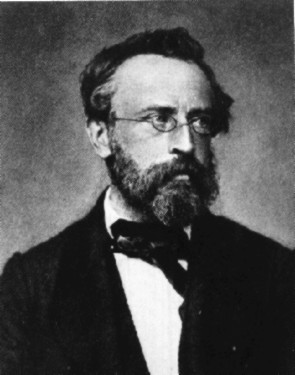| Profile | Major Works | Resources |
Bruno Hildebrand, 1812-1878.

![]()
German Historicist of the "older" school. Bruno Hildebrand was trained in history in the University of Breslau. He moved on to a teaching position at the University of Marburg, where he crossed paths with younger historicist, Karl Knies.
In 1848, Hildebrand published his famous radical methodological treatise. Hildebrand relentlessly attacked Classical Ricardian economic theory for being materialistic, universalistic and cosmopolitan. Not only did he not believe in natural "economic laws", as advocated by the Ricardians, he also rejected all "laws" of historical development that had been put forth by his fellow historicist, Wilhelm Roscher. Instead, Hildebrand wanted a general "theory of everything", a holistic but relativistic Staatswissenschaften.
Nonetheless, Hildebrand later contradicted his own precepts, developing a quite distinct "linear stages" theory of economic history. It was Hildebrand who was primarily responsible for the stages theory of money, whereby exchange economies pass linearly from Naturalwirtschaft (barter economy) to Geldwirtschaft (gold/commodity money economy) and finally Kreditwirtschaft (credit economy). Despite historical evidence to the contrary, Hildebrand's theory has found its way into economic folklore.
During 1848, the year of revolutions, Hildebrand served as a liberal deputy in the famous Frankfurt constitutional assembly. When that ill-fated political adventure collapsed, Hildebrand was forced to resign his academic chair and went into a decade-long exile in Switzerland. There, he taught at the universities of Zurich and Bern, and worked for the local statistical bureaus.
In 1861, Hildebrand returned to Germany to take up a post as professor at the University of Jena. He concentrated primarily on contemporary empirics and statistics, thereby not making much use of the Historicist method. Nonetheless, Hildebrand became the primary link between the "Older" and "Younger" strands of the German Historical School. His famous "Jena Seminar" was the breeding ground for the next generation. In 1863, Hildebrand launched the Jährbucher für Nationalökonomie und Statistik (JNS) which was to become one of the leading Historicist journals, which he would pass on to his son-in-law Johannes Conrad in 1878. Hildebrand also helped found the Verein für Sozialpolitik in 1872.
|
Major Works of Bruno Hildebrand
|
|
HET
|
|
Resources on Bruno Hildebrand
|
All rights reserved, Gonçalo L. Fonseca
